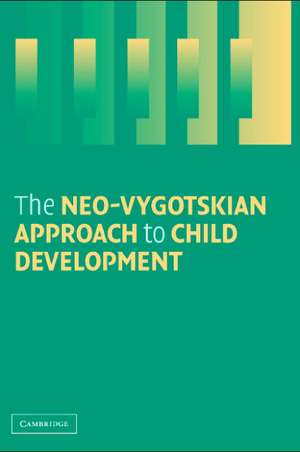The Neo-Vygotskian Approach to Child Development
Autor Yuriy V. Karpoven Limba Engleză Hardback – 26 iun 2005
| Toate formatele și edițiile | Preț | Express |
|---|---|---|
| Paperback (1) | 300.41 lei 6-8 săpt. | |
| Cambridge University Press – 27 aug 2006 | 300.41 lei 6-8 săpt. | |
| Hardback (1) | 699.12 lei 6-8 săpt. | |
| Cambridge University Press – 26 iun 2005 | 699.12 lei 6-8 săpt. |
Preț: 699.12 lei
Preț vechi: 812.93 lei
-14% Nou
Puncte Express: 1049
Preț estimativ în valută:
133.80€ • 139.32$ • 113.07£
133.80€ • 139.32$ • 113.07£
Carte tipărită la comandă
Livrare economică 10-24 martie
Preluare comenzi: 021 569.72.76
Specificații
ISBN-13: 9780521830126
ISBN-10: 0521830125
Pagini: 300
Dimensiuni: 152 x 229 x 21 mm
Greutate: 0.56 kg
Ediția:New.
Editura: Cambridge University Press
Colecția Cambridge University Press
Locul publicării:New York, United States
ISBN-10: 0521830125
Pagini: 300
Dimensiuni: 152 x 229 x 21 mm
Greutate: 0.56 kg
Ediția:New.
Editura: Cambridge University Press
Colecția Cambridge University Press
Locul publicării:New York, United States
Cuprins
Introduction: the problem of determinants and mechanisms of child development; 1. Vygotsky's approach to child development; 2. The neo-Vygotskian elaboration of Vygotsky's approach to child development; 3. First year of life: emotional interactions with caregivers as the leading activity of infants; 4. Second and third years of life: object-centered joint activity with adults as the leading activity of toddlers; 5. Three to six-year-olds: sociodramatic play as the leading activity during the period of early childhood; 6. The period of middle childhood: learning at school as children's leading activity; 7. The period of adolescence: interactions with peers as the leading activity of adolescents; 8. Conclusion - the neo-Vygotskian approach to child development: accomplishments and shortcomings.
Notă biografică
Descriere
The innovative neo-Vygotskian approach to child development is introduced to English-speaking readers.














